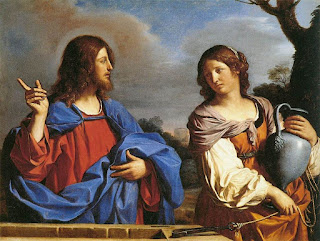Isaiah 7.10-14
Hebrews
10.4-10
Luke 1.26-38
“In the
sixth month the angel Gabriel was sent by God to a town in Galilee called
Nazareth.” As soon as today’s Gospel reading begins, we are anchored in time
and space. The sixth month, in Nazareth.
And we
might add, as we do on Christmas night, “In the one hundred and ninety–fourth
Olympiad; the seven hundred and fifty–second year from the foundation of the
city of Rome; the forty–second year of the reign of Octavian Augustus; the
whole world being at peace”.
It is
very specific. The eternal God enters time and space, and necessarily does so
in one time and one place. God becomes anchored in this world. The Word becomes
flesh, not as an idea, but as someone dwelling among us. From now on, God has
an address, and a diary.
But we
might ask, why then? Saint Paul in Galatians says, “when the fullness of time
had come, God sent his Son, born of a woman”. Humanity had been around for countless
thousands of years, but this crucial saving moment waits for the “fullness of
time”. What is that?
The
first thing to say in response is of course that God is God and we are not. God
alone sees all. We accept as a matter of faith that Divine providence disposes
all things for the best, though we do not always see that for ourselves.
But we
can say, looking at the grand sweep of history, that this was a singularly
fitting moment. God’s revelation of himself had been gradual, over thousands of
years preparing humanity for the fullness that we might not have been able to
bear all at once. The spiritual inklings and yearnings of every race and
culture have always led people towards God, even if in obscure and partial
ways.
In that
grand scheme one particular race and culture, the Jews, had been chosen by God
to receive a fuller revelation, the Law and the Prophets, revealing God as One,
the absolute act of existence in himself, upholding a revealed standard of worship,
righteousness and integrity.
Jewish
people had spread throughout the world, East and West and North and South,
taking with them that revelation. Their faith shone like a beacon through the
fog of a pagan world that had forgotten its ancient wisdom and grown old and
weary amid debased barbaric rites. All over the world Gentile believers, the
“God-fearers”, gathered to the Synagogues to hear that saving truth.
With
the rise of the Roman empire much of the known world was united in one common
language, easy travel and communication. The world was ripe for God’s full
revelation of himself. It was primed for the start of a new movement bearing
that revelation that would spread like wildfire, the movement that we call the
Church.
So in
the sense of history the fullness of time certainly had come. But there is a
deeper meaning too. Time is what human beings inhabit, what the Bible calls the
“aeon” – this age or dispensation of the world. The fullness of time is the
culmination of the age of yearning and hunger for God, the fullest extent of
humanity reaching out to the Divine.
It is
Mary herself who is the fullness of time in that sense, the culmination of the
human age. She stands on the pinnacle of our reaching towards God. She is our
mouthpiece and representative in that moment. Preserved by God’s prevenient
grace from sin she is the first of our race able to say “yes” to God in
complete freedom and simplicity. And she does so. In the words of an Orthodox
hymn, she “has given answer for the whole of creation to the redeeming love of
God”.
And in
that moment of the Annunciation the fullness of time, given expression by Mary,
is answered by the fullness of God, the Second Person of the Trinity emptying
himself to become human in time and space in her womb.
Time,
the human age, this present dispensation, is not enough. We yearn for God but
cannot reach him. And so God comes to us, joining his nature to ours in one
person, so that all human nature can be adopted in Christ as children of God
and heirs of eternal life.
The
Annunciation is the meeting point of time and eternity, where the fullness of
human longing, powerless by itself, is met and raised up by the fullness of
God. From that meeting point everything flows. The life and teaching of Christ,
his foundation of the Church, the sacraments and scriptures, our adoption in
Christ, the life of God himself open to every human being. All that flows from
and is made possible by this moment.
No
wonder the Church says the Angelus, the commemoration of this moment, almost
obsessively, morning, noon and night calling to mind that moment when the
handmaid of the Lord said, “be it unto me according to your word”, and the Word
was made Flesh and dwelt among us. For
that meeting point, the intersection of time and eternity, is where the Church
lives, and where our true life is to be found, the fullness of human longing
taken up into the fullness of the life of God.


